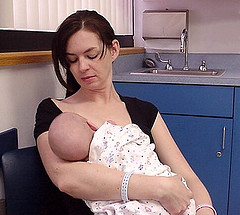
 Some rights reserved by EraPhernalia Vintage
Some rights reserved by EraPhernalia Vintage
The benefits of breastfeeding are countless, and any breastfeeding mother knows she is doing the best thing for her child, no matter the gender. A recent study further confirms breast is best, especially for little boys, at least Down Under.
Published in Pediatrics, researchers found boys breastfed for at least six months outperformed their peers in academic tests.
The International News reports:
The research, which followed more than 1,000 Australian children, found that 10-year-old boys who had been predominantly breastfed until at least the age of 6 months did somewhat better on a set of academic tests.
Compared with boys who’d been breastfed for less time, they scored an average of 10 percent higher in math and writing, 8 percent higher in spelling and 6 percent higher in reading.
Of course, parenting is also a factor, and researchers did account for parental education level and socioeconomic status in the study. Breastfeeding was still associated with higher cognitive abilities even in consideration of these other factors.
Researchers are not sure why the cognitive benefits were not present in the girls in the study.
There is evidence that boys are more vulnerable to “adversity” during critical periods of brain development than girls are. It’s possible, Oddy explained, that the estrogens in breast milk, thought to have a protective effect on brain cells, benefit boys more than they do girls.
Another theory is that boys might gain more from the mother-child bonding that comes with breastfeeding.“A number of studies have found that male babies are more dependent on maternal attention to help develop their cognitive and language skills,” Oddy said.
Obviously, this information is not meant to dissuade mothers from breastfeeding their little girls.
My only beef with this… is that breastfeeding is not “best” — breastfeeding is the physiologically NORMAL way to feed human babies. Which means that we need to change our language. In this study, baby boys who are breastfed have NORMAL intelligence. They are the ones that the alternatives should be measured against. Therefore, baby boys who are NOT breastfed are LESS intelligent than their breastfed peers. We need to stop talking about “best” and “benefits.” Breastfeeding is normal, the alternative is less than normal. All these studies need to be reframed with language that reflects what is actually biologically normative for human babies.
As a rough guide how much you can take your baby probably will be during the day by taking an average of 70 g a formula for every 450 g of weight of your baby. For example, babies 4500 g heavy will eat about 700 g formula for 24 hours. Keep in mind that this will not apply to smaller babies, premature babies or babies over 6 months of age.
It is also important to remember that all babies are different, some have a greater appetite than others bearing in mind that your baby is still physically progressing and if your pediatrician is satisfied with his / her progress, then why you do not have to worry about.
You will notice that generally baby taking less milk you do not feel good, and more milk when you grow faster (this typically occurs between 2.3. and 6 weeks and 3 and 6 months of age), and this is completely normal.